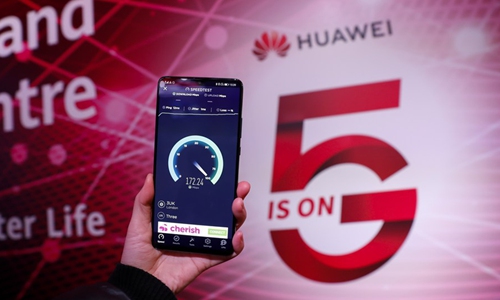China, Indonesia sign MoU on internet security amid Washington pressure on Beijing's 5G technology

Huawei 5G File photo: Xinhua
China and Indonesia have signed a memorandum of understanding (MoU) on developing capacity building of internet security and tech cooperation, marking the first-of-its-kind internet security agreement China signed with a foreign country which observers said represents the latest series of "strategic counterattacks" Beijing has launched to shatter Washington's anti-China clean network program and break the US-led blockade.The agreement with the largest Southeast Asian (SEA) economy will likely attract more economically neutral SEA nations to follow, paving way for Chinese firms including Huawei - which now strategically pulls back from the European market - to tap into a rising market with large population "with a sense of certainty," analysts noted.
The MoU is signed during Chinese State Councilor and Foreign Minister Wang Yi's official visit to Indonesia, according to a statement on the website of China's Foreign Ministry on Wednesday.
During Wang's meeting with Luhut Binsar Pandjaitan, Indonesia's Coordinator for Cooperation with China, Wang noted that both countries should jointly uphold digital security and create a shared community focused on cyber security, the statement noted.
Chinese observers said that the MoU on cyber security is of great significance at time when the US is ramping up pressure on its political allies to exclude Chinese tech firms on claimed "national security threat."
"This is one of the latest government-level counterattacks China organized with partners to confront the malicious US crackdown," Ma Jihua, a veteran industry analyst, told the Global Times on Wednesday.
Ma noted that the US has been deploying national power to curb Chinese firms, and it is extremely difficult for a single firm like Huawei to resist such pressure. Now, a government-to-government framework provides a legal basis upon which Chinese telecom firms are able to expand overseas without subjecting them to arbitrary restrictions.
Analysts expected the deal to cement mutual trust in internet security, including terms on mutual telecom market openness and most importantly, on pledges that a country won't ask its firms to provide any backdoor to seize intelligent information of the other nation.
With a GDP of about $1 trillion, Indonesia is the largest economy in Southeast Asia and its move could carry certain level of impact on the other SEA countries, most of which are growing to be politically independent from the US and economically neutral.
"The deal with Indonesia on cyber security will set an example for other SEA economies, especially given the backdrop of closer economic ties between China and SEA nations that benefit both sides," Ma said.
Xu Liping, director of the Center for Southeast Asian Studies at the Chinese Academy of Social Sciences, told the Global Times on Wednesday that it is likely that SEA countries including Thailand, Malaysia and the Philippines, markets in which Chinese companies have a strong presence in infrastructure construction, would likely follow suit.
But countries including Vietnam and Singapore, which hold a wait-and-see attitude on Chinese investment, could be "vague ?on signing such deal, according to Xu.
A rapidly-growing SEA market - which has a population over 600 million and is still in the early stage of internet deployment, could also help Chinese telecom company Huawei to cushion setbacks in Europe, analysts added.


